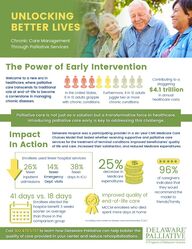
Return to flip book view
96%of caregiversindicated thatthey wouldrecommend themodel tofriends/familyEnrollees used fewer hospital servicesfewerinpatientadmissions26% 14% 38%fewerEmergencyDept. visitsfewer days in ICU25%decrease inMedicareexpendituresEnrollees elected thehospice benefit 3 weekssooner on average than those in thecomparison group 41 days vs. 18 daysMCCM enrollees who diedspent more days at homeImproved quality ofend-of-life care Furthermore, 4 in 10 adultsjuggle two or morechronic conditions.In the United States, 6 in 10 adults grapplewith chronic conditions.UNLOCKINGBETTER LIVESChronic Care ManagementThrough Palliative ServicesImpactIn ActionAccording to the Centers for Disease Control and Prevention (CDC)Delaware Hospice was a participating provider in a six-year CMS Medicare CareChoices Model that tested whether receiving supportive and palliative careservices for the treatment of terminal conditions improved beneficiaries’ qualityof life and care, increased their satisfaction, and reduced Medicare expenditures.The Power of Early InterventionWelcome to a new era inhealthcare, where palliativecare transcends its traditionalrole at end-of-life to become a cornerstone in managingchronic diseases. Contributing to a staggering in annual healthcare costs.$4.1 trillion
UNLOCKINGBETTER LIVESChronic Care ManagementThrough Palliative ServicesSymptomManagementCareCoordinationAdvanced Care PlanningSupportand EducationGoals of Care for Chronic ConditionsGuiding patientsand their familiesthrough the mazeof chronic illness.Enhancing the qualityof life by addressingsymptoms andconcerns.Navigating thecomplex healthcaresystem for seamlesspatient experience.Empowering patientsto make informeddecisions about theirfuture care.Palliative CareEnhances theOverall Qualityof Care WithinYour CenterContributes to Reducing RehospitalizationsProactively managing symptoms, preventingcomplications, and addressing patients' preferencesultimately promote a higher quality of life within theskilled nursing facility setting. Facilitates Seamless Transitions in CareEnsuring a coordinated handoff between differenthealthcare settings, maintaining continuity, andpreventing disruptions in the care journey.Focuses on a Holistic Approach to Patient Well-beingAddressing not only the physical aspects of a patient'scondition but also attending to their emotional andpsychosocial needs.Through these integrated efforts,palliative care becomes anindispensable partner in elevatingthe standard of care in skillednursing facilities.